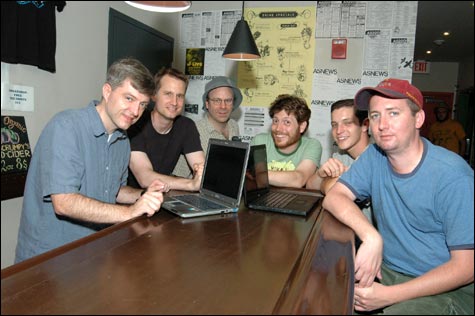
SOCIALLY ACTIVE: Templin (second from left) has helped link the local IT community through the Providence Geeks.
Photo by Richard McCaffrey |
Sara Czyzewicz earned a computer science degree at Rhode Island College and a new-media certificate from imedia, proved her Web design skills at the Westin Providence and a local firm — and then promptly left the state, as have thousands of ambitious 20-somethings have before her.
She worked for the ad agency Crispin Porter & Bogusky in Miami, then in Boulder, Colorado, where she thrived on the vibrant tech entrepreneurship culture. In April, she co-founded a startup, Weavemet, to develop a social networking tool called DandyID.
Almost immediately, there was an acquisition offer on the table, and then a cash infusion that will allow the firm to employ five or six people through next summer. But here's the twist: DandyID won't be based in Boulder. It's moved to Providence.
"There is a whole new level of energy here that doesn't exist in a lot of other places," Czyzewicz says. "Boulder seems a little more geared toward technology entrepreneurs and business, whereas Rhode Island also has that artistic, design, creative side." She adds, "You are who you hang around with." In Providence, "people feed off one another's energy, and that has helped us tremendously."
DandyID is the kind of startup that excites local techies and economic development leaders alike: young people on the cutting edge of technology and social trends, with an idea likely to make it big, and a commitment to grow in Rhode Island.
Czyzewicz, a Pawtucket native, is part of a growing wave. In the last few years, a slew of new technology firms have emerged here, from Web and mobile application designers, to biomedical informatics and engineering experts, to military contractors, to companies that leverage IT to more efficiently sell insurance, run wellness programs, and more.
This, many believe, is the future of Rhode Island, and what Saul Kaplan, the head of the state Economic Development Corporation until last December, envisioned: a vibrant knowledge-based economy fueled by startups, good-paying jobs, academic spin-offs and public-private collaborations.
But Kaplan is out, and since he stepped down, some have suggested that he was ineffectual at the EDC, too caught up in blue-sky ideas to grasp what the state needs today.
His interim replacement, Michael Saul, is a finance expert whose focus at the EDC has been, by his own description, "the more traditional" side of the economy. And while no one has said that technology and innovation will be dropped as EDC priorities, Governor Donald L. Carcieri has said this an opportunity to "take a look" at the state's economic strategy.
None of this should come as a surprise, given the depth of Rhode Island's recession, with unemployment at 10 percent and even such onetime stars as Fidelity Investments and American Power Conversion having cut jobs.
To revitalize the economy, the state will likely need to build on multiple sectors — strengths such as health-care, higher education, arts and hospitality, as well as on weakening, but still-important areas, including manufacturing. And it will have to address serious problems with housing, workforce preparedness, and growing poverty.